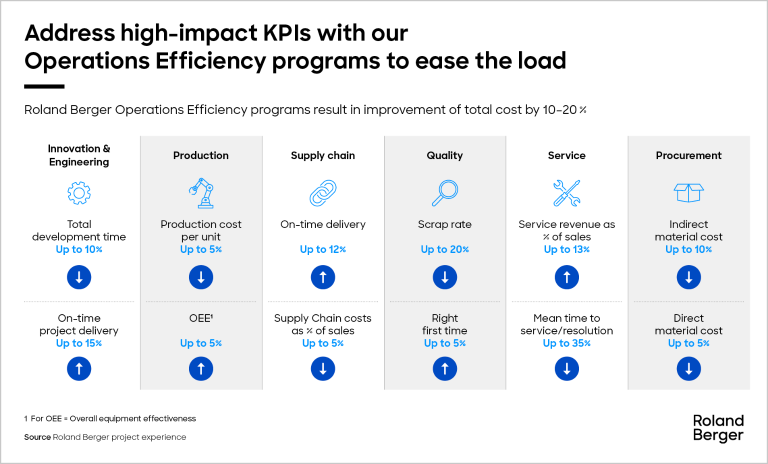The Roland Berger model for robust and future-proof operations makes companies adaptable, agile and resilient.


Navigating the cost of capital crisis in the Middle East
Redefining success in the Middle East by thriving amid high capital costs through efficiency
In recent years, businesses in the Middle East have faced a growing challenge: rising costs of capital. Driven by global economic shifts, elevated interest rates, and evolving demographic dynamics, companies across the region are grappling with the reality of a tighter financial landscape. The traditional focus on rapid growth and expansive investments is being reconsidered. As the cost of capital continues to escalate, a pivot toward operational efficiency is emerging as a critical strategy for sustaining growth and competitiveness.

The cost of capital crisis
The global economic landscape has undergone significant turbulence in recent years, impacting regions worldwide, including the Middle East. For businesses in the region, the rising cost of capital has become a new barrier. Higher interest rates, inflation, and shifting investor expectations are at the core of this challenge, leading to increased borrowing costs and making financing new projects or managing debt more expensive.
Middle Eastern economies, many of which are closely tied to the US dollar, have felt the ripple effects of higher interest rates in global markets. This alignment has resulted in heightened costs for accessing capital, complicating efforts to invest in growth opportunities or sustain liquidity. Simultaneously, the region’s evolving demographics—characterized by a growing young population and changing consumer behaviors—offer both opportunities and risks. While these demographic shifts could drive future growth, they also require substantial capital investment to serve an expanding and diverse market, which is becoming increasingly difficult to secure.
A strategic shift toward operational efficiency
In response to the rising cost of capital, businesses must rethink their strategic focus. The need for a shift from growth-at-any-cost to a more balanced approach, emphasizing operational efficiency, is becoming more evident. Historically, companies in the Middle East have prioritized growth, often pursuing aggressive expansion into new markets, investing heavily in large-scale infrastructure projects, and engaging in mergers and acquisitions. While these strategies have driven remarkable economic progress, they have also resulted in higher levels of debt and capital demands.
However, the current economic environment necessitates a new approach. Businesses need to explore how they can achieve similar or even superior outcomes by optimizing their internal operations and utilizing resources more efficiently. Businesses in the Middle East can draw from experience across the globe from more cash-constrained economies. The focus now is on enhancing productivity, reducing operational waste, and maximizing value from existing assets. In essence, companies must achieve "more with less" (i.e. sustainable growth).
"Operational efficiency is the bridge to sustainable growth in a high-cost capital environment."
Transforming the business mindset
For Middle Eastern businesses to thrive in this new reality, a fundamental shift in mindset is required. Leaders must prioritize a strategy that balances the aspiration for growth with a rigorous focus on operational efficiency. Companies that excel in this environment will be those that can streamline their processes, cut unnecessary costs, and enhance the productivity of their workforce.
Adopting this mindset involves a thorough reassessment of every aspect of the business. From supply chain management to production processes, customer service, and workforce optimization, each function must be scrutinized for potential improvements. Companies should leverage digital transformation, data analytics, and automation to drive efficiency gains and improve decision-making.
Growth through efficiency: The new paradigm
The focus on operational efficiency should not be seen as a departure from the region's growth-oriented approach but rather as an evolution towards sustainable success in a higher-cost environment. Emphasizing efficiency does not mean curbing ambition or scaling back; instead, it is about achieving growth smarter and more sustainably. By reducing waste, cutting excess, and ensuring every investment is strategically aligned and cost-effective, businesses can position themselves to thrive amid rising capital costs, and the competitiveness of the region can be further pushed forward through efficiency.
This approach is particularly relevant for sectors like retail, manufacturing, logistics, and services, where cost structures can be significantly optimized through better planning, process improvement, and leveraging technology. In capital-intensive industries like energy and infrastructure, adopting lean practices, improving project management, and enhancing asset utilization can lead to significant cost savings and better financial performance.
The path to sustainable competitiveness
The economic landscape in the Middle East is undergoing a profound transformation, shaped by global economic crises, elevated interest rates, and changing demographics. These forces have collectively elevated the cost of capital, demanding a reassessment of traditional business strategies. To remain competitive and sustainable in this evolving environment, companies must adopt a dual focus on growth and operational efficiency.
Businesses that are quick to embrace this new paradigm viewing efficiency not as a constraint but as a pathway to innovation and value creation, will lead the way in shaping a more sustainable and prosperous future for the region. At Roland Berger, we understand that navigating these challenges requires a comprehensive approach. Our "Operations Efficiency Programs" offer an end-to-end, scalable solution that ensures cross-functional optimization, leveraging proprietary tools and a hands-on approach to drive maximum results for businesses looking to excel in this new reality.
By prioritizing operational efficiency alongside strategic growth, companies in the Middle East can turn the current cost of capital crisis into an opportunity for reinvention, setting the stage for long-term success and resilience in the years ahead.
Roland Berger’s approach empowers businesses by fostering cross-functional collaboration and operational excellence across various stages of the value chain. From initial innovation to customer service, we focus on creating synergies that enhance productivity, quality, and margins. Through an end-to-end framework, we start with a quick audit, followed by tailored concept development, ensuring that our clients capture comprehensive value over time. This structured yet adaptable process allows companies to maximize efficiency and align resources effectively, ultimately building resilience in today’s challenging economic landscape.




